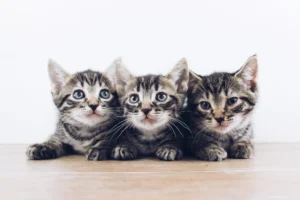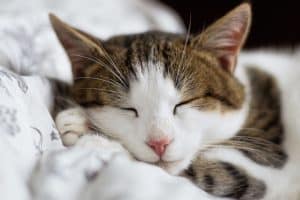As cats age, it’s not uncommon for their once fearless demeanor to be replaced by a more skittish and anxious behavior. But why exactly do cats get more scared as they get older? Let’s explore the reasons behind this common phenomenon.
Cats are susceptible to age-related changes in their senses and cognitive abilities, leading to increased fear and anxiety.
Decline in Vision and Hearing
As cats age, their vision and hearing tend to decline, just like humans. Cataracts and hearing loss are common in older cats, making them more vulnerable to startling easily. Imagine not being able to see or hear as well as you used to – it can be frightening for our feline friends. This sensory decline can cause them to be more cautious and on edge, as they struggle to perceive the world around them. To help comfort your older cat, consider creating a safe and familiar environment for them, and be extra sensitive to their needs as they navigate their changing senses.
Reduced Mobility and Flexibility
Arthritis and other age-related conditions can take a toll on a cat’s mobility and flexibility. Just like us, cats can experience joint pain and stiffness as they age, which can make them less able to escape perceived threats. Picture trying to run away with sore, achy joints – it’s not easy! This decreased mobility can leave older cats feeling more vulnerable and fearful in potentially stressful situations. Providing elevated resting spots, warm bedding, and low-entry litter boxes can help ease discomfort and boost your cat’s confidence in their movements. Extra tip: Consider asking your veterinarian about supplements or medications that can help alleviate your cat’s arthritis pain and improve their overall quality of life.
Memory and Cognitive Decline
As cats age, they may experience cognitive decline, which can impact their ability to process and respond to fear-inducing stimuli. Just like humans, older cats may struggle with memory, learning, and decision-making. This decline can result in heightened anxiety and fear responses, as they may not be able to assess situations accurately or remember past experiences that could help them feel safe. In some cases, cats may startle more easily or become more wary of unfamiliar situations due to cognitive changes.
Increased Sensitivity to Changes
Older cats can become more sensitive to changes in their environment, which can lead to increased fear and stress. As they age, cats may struggle to adapt to new routines, introductions of new pets or people, or modifications to their living space. These changes can trigger anxiety in older cats, as they may find comfort in familiar surroundings and established routines. Additionally, sensory changes, such as decreased vision or hearing, can make older cats more susceptible to feeling frightened or threatened by unexpected changes in their environment.
Additional Unique Insight or Angle:
- Routine is Key: Maintaining a consistent routine can help reduce fear and anxiety in older cats. Establishing regular feeding times, play sessions, and quiet moments of rest can provide a sense of security and predictability for older feline companions.
Remember, older cats may require extra patience and understanding as they navigate these changes in their golden years. Providing a calm and stable environment, along with plenty of love and attention, can go a long way in helping your senior cat feel safe and secure.
Past Trauma and PTSD
Older cats may become more scared due to past traumatic experiences resurfacing. Cats, like humans, can suffer from post-traumatic stress disorder (PTSD) caused by past abuse, abandonment, or other frightening events. These memories can haunt them as they age, leading to increased anxiety and fear.
One way to help cats with past trauma is to provide them with a safe and secure environment. Creating a quiet space where they can retreat to when feeling overwhelmed can help alleviate their anxiety. Additionally, patience and understanding are key when dealing with a cat that has experienced trauma. Building trust slowly and consistently can help them feel more secure as they age.
Further Reading: For more information on helping cats with past trauma, check out this resource from the American Society for the Prevention of Cruelty to Animals (ASPCA) here.
Handling Anxiety in Older Cats
As cats age, they may become more anxious due to various factors such as changes in their environment, health issues, or loss of sensory abilities. To help older cats cope with increased fear and anxiety, it’s essential to provide them with a predictable routine and plenty of mental and physical stimulation.
Engaging older cats in interactive play sessions, using puzzle feeders, and providing hiding spots can help reduce their anxiety levels. Additionally, creating a soothing environment with calming music or pheromone diffusers can create a sense of security for older cats.
Remember, older cats may need extra patience and understanding as they navigate their anxiety. By providing a stable and enriched environment, you can help them feel more comfortable and secure in their golden years.
Key Strategies for Handling Anxiety in Older Cats: 1. Maintain a consistent daily routine to reduce stress. 2. Provide mental and physical stimulation through interactive toys. 3. Create a quiet and secure space for your cat to retreat to when feeling anxious.
By implementing these strategies, you can help your older cat feel more at ease and comfortable as they navigate their later years.
Creating a Safe Environment
As cats age, they can become more anxious and fearful due to a variety of factors such as declining senses, health issues, or changes in their environment. To help alleviate their stress and create a safe space for them, consider providing cozy hiding spots where they can retreat to when they feel overwhelmed. Additionally, ensure there are no loud noises or sudden disturbances that could startle them.
Make sure your older cat has easy access to their essentials like food, water, and litter box, as they may not move as quickly as they used to. Creating a routine and sticking to it can also help reduce their anxiety by providing a sense of predictability. Lastly, consider investing in calming pheromone diffusers or sprays to help soothe your senior cat’s nerves.
An additional unique insight is to set up a warm and sunny spot for your older cat to bask in some natural light, which can have a comforting and calming effect on them. This simple addition to their environment can make a big difference in their overall well-being.
Celebrating Your Senior Cat
Having a senior cat can be a rewarding experience that comes with special care and attention. As cats age, they may become more affectionate and enjoy quiet cuddle sessions with their owners. Take the time to celebrate their life and the bond you share by spending quality time together.
Senior cats may have specific dietary needs, so consider switching to a senior cat food formula that supports their aging bodies. Regular vet check-ups are essential to catch any health issues early on and ensure your senior cat remains happy and healthy. Providing mental stimulation through interactive toys or games can also help keep their minds sharp and alleviate anxiety.
Remember, your senior cat has been with you through thick and thin, so show them love and appreciation as they enter their golden years. They may need a bit of extra care, but the companionship and joy they bring are truly priceless.
Additional Resource : For more information on caring for senior cats, check out this resource from the American Association of Feline Practitioners: Caring for Your Senior Cat
Alex, a passionate animal lover, has experience in training and understanding animal behavior. As a proud pet parent to two dogs and three cats, he founded AnimalReport.net to share insights from animal experts and expand his knowledge of the animal kingdom.









